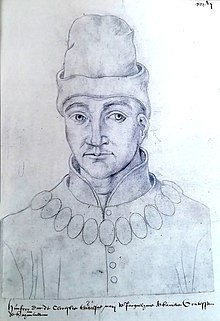Humphrey, Duke of Gloucester
Humphrey, Duke of Gloucester KG (born October 3, 1390 , † February 23, 1447 in Bury St. Edmunds ) was an English nobleman and temporarily regent of England . He was the fifth son of King Henry IV of England and his first wife Mary de Bohun .
Life
Humphrey was named after his grandfather Humphrey de Bohun, 7th Earl of Hereford . In 1414, Humphrey was raised to Duke of Gloucester and Earl of Pembroke . In 1415 he took up the post of Lord Warden of the Cinque Ports . When his brother, King Henry V died in 1422, he became regent of the kingdom and protector of his young nephew Henry VI .
Marriages and offspring
Around 1422 he married Jakobäa , the Duchess of Straubing-Holland , daughter of Duke Wilhelm II of Straubing-Holland. This marriage gave Humphrey the title of Count of Holland, Zealand and Hainaut , which was claimed by the Duke of Burgundy, Philip the Good .
The marriage was annulled in 1428 and Jacobea died disinherited in 1436. Gloucester married his former mistress Eleanor Cobham . Children of Humphrey and probably Eleanor Cobham were Antigone Plantagenet, who married Henry Gray, Earl of Tancarville , and John Plantagenet, who died young.
Loss of influence and death
In 1441 Eleanor Cobham was tried against the king for witchcraft. She was accused of trying to secure her husband's rule by magic. This was an attempt by the court party to Cardinal Henry Beaufort and William de la Pole, 1st Duke of Suffolk , the influence that their husband had on Henry VI. had to weaken. She was sentenced to three barefoot penance walks through London and subsequent life imprisonment. She died in prison.
His position at court was weakened by the trial of his wife. In 1444 he was no longer involved in the peace negotiations in Tours, in which the wedding between Henry VI. and Margaret of Anjou was agreed. Furthermore, the king declared his renunciation of the county of Maine. When Gloucester learned of this secret clause, he wanted to discuss it before Parliament.
The Duke of Suffolk acted quickly and had him arrested for high treason in 1447. He died under unexplained circumstances a few days later at Bury St. Edmunds in Suffolk .
Afterlife
Suffolk outlived him by a full three years. He was killed in circumstances as mysterious as the Duke of Gloucester. But the people had long since named him Good Duke Humphrey .
Others
With the gift of over 250 books, he founded a library in Oxford. He promised money to build a new building. This was destroyed in the 16th century. His name lives on in Duke Humfrey's Library, part of the Bodleian Library in Oxford .
He appears as a character in the plays " Heinrich V. " and " Heinrich VI. " By William Shakespeare .
Individual evidence
- ^ Powicke & Fryde: Handbook of British Chronology. Second Edition, London, 1961, p. 430
- ↑ H. Vollrath & N. Fryde (eds.): The English Kings in the Middle Ages; From William the Conqueror to Richard III. Beck, 2004, ISBN 3-406-49463-3 , p. 189
- ^ Alison Weir: Britain's Royal Families: The Complete Genealogy . The Bodley Head, 1999, ISBN 978-0-09-953973-5 , pp. 125 .
- ↑ a b c H. Vollrath & N. Fryde (Ed.): The English Kings in the Middle Ages; From William the Conqueror to Richard III. Beck, 2004, ISBN 3-406-49463-3 , p. 192
- ↑ H. Vollrath & N. Fryde (eds.): The English Kings in the Middle Ages; From William the Conqueror to Richard III. Beck, 2004, ISBN 3-406-49463-3 , p. 193
- ^ Alan & Veronica Palmer: The Pimlico Chronology of British History; from 250,000 BC to the Present Day. Pimlico, 1996, ISBN 0-7126-7331-8 , p. 122
Web links
- Humphrey Plantagenet, Duke of Gloucester on thepeerage.com , accessed July 26, 2015.
- GL Harriss: Humphrey, duke of Gloucester (1390-1447) . In: Oxford Dictionary of National Biography , Oxford University Press, 2004; Online version (as of May 2011) viewed on March 31, 2012 License required
- Publications on Humphrey, Duke of Gloucester in the OPAC of the Regesta Imperii
| personal data | |
|---|---|
| SURNAME | Humphrey, Duke of Gloucester |
| ALTERNATIVE NAMES | Humphrey Plantagenet, Humphrey Lancaster |
| BRIEF DESCRIPTION | Regent of England |
| DATE OF BIRTH | October 3, 1390 |
| DATE OF DEATH | February 23, 1447 |
| Place of death | Bury St. Edmunds |

